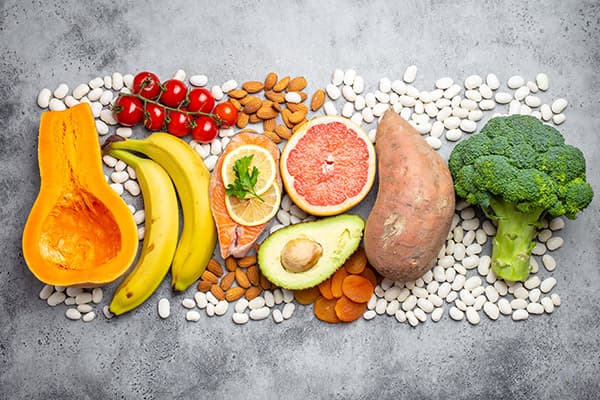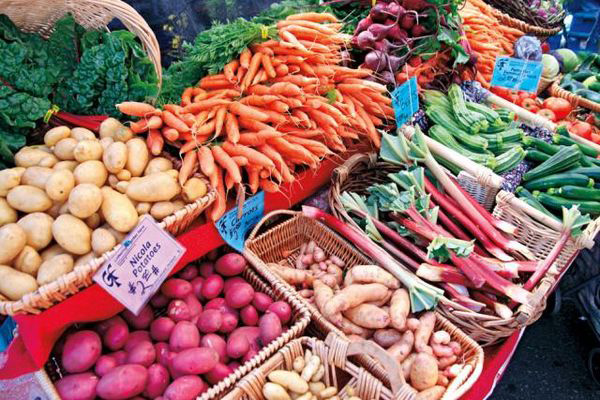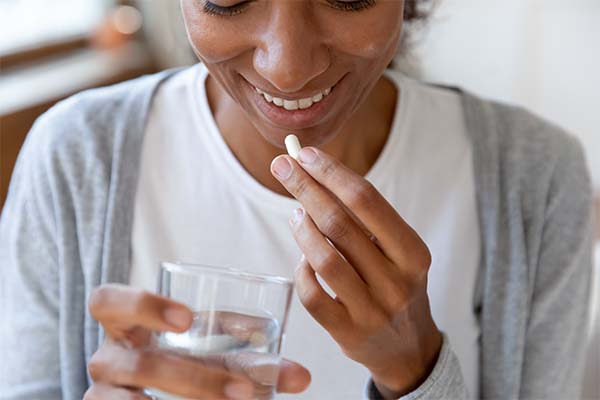Benefits of Potassium and Top Food Sources
Potassium is a mineral that's often paired with magnesium in supplement form, and for good reason. Potassium and magnesium are two of the most important electrolyte minerals utilized by the human body, and it’s important that you’re taking in enough of both to maintain the hundreds of bodily functions that require the two minerals. For more on magnesium, be sure to check out Magnesium Benefits and Uses. For now, however, let's take a closer look at the benefits and natural food sources of potassium.
Potassium Fast Facts:
- Daily adequate intake ranges from about 2,300 to 3,400 mg for adults1
- Potassium is found in every cell of the human body, helping to regulate hydration along with cellular and nerve function 1
- Whole foods, including bananas, cashew nuts and tuna are natural sources of potassium1
If you’re eating a healthy diet loaded with fresh fruits and vegetables, whole grains and nuts, you’re likely covering your daily need for potassium. Squash, potatoes, spinach, avocados, beans, bananas, Brussels sprout, broccoli, etc., are all wonderfully rich sources of natural potassium that can be easily added to your diet to fill in any gaps.
While extremely low potassium may be uncommon, low potassium levels can come with the following concerns:3
- Muscle weakness
- Fatigue
- Headache
- Irregular heartbeat
- Mood changes
- Constipation
- Nausea and vomiting
Top Health Benefits of Potassium
Potassium helps your muscles contract, regulates your body fluids, helps maintain a healthy blood glucose response and normal blood flow levels, transmits nerve impulses and plays a big role in maintaining overall cardiovascular health.1 Here’s a closer look at some of potassium’s most important benefits.
Hydration support
Potassium is a key electrolyte, which helps your cells (specifically nerve, heart and muscle cells) transmit electrical impulses that control things like muscle contraction and transmission of information in your brain.2 Electrolytes like potassium are found within bodily fluids, including urine, blood and sweat, and are regulated by your kidneys. Maintaining a proper electrolyte balance is critically important to maintain overall wellness.4
Muscle function
Potassium is required for the regular contraction and relaxation of muscles, including skeletal muscles and the heart.2 You might see athletes, especially endurance athletes, consuming a lot of bananas and avocados because the high amount of potassium in these foods helps control muscle cramps. Also, as your heart is a muscle, potassium helps maintain a regular heartbeat.
Cardiovascular support
Potassium plays an important role in supporting cardiovascular health, such as maintaining normal blood flow readings. Part of this process of promoting heart health may be in the way potassium helps calcium in the arteries reach the parts of the body it needs to, thereby supporting arterial health.5
Bone health
Research is looking into the possible correlation between bone density and potassium. A 2015 study published in Osteoporosis International from the University of Surrey found that a high consumption of potassium salts significantly decreases the urinary excretion of both acid and calcium, helping to maintain vital mineral content.
15 Potassium-Rich Foods
1Avocado: An average avocado = about 1,000 mg of potassium
2Winter Squash: One cup of cooked squash = nearly 900 mg of potassium
3Sweet potato: One medium-sized baked sweet potato = about 700 mg of potassium
4Potato: One medium-sized baked potato (skin on) = about 600 mg of potassium
5White beans: A half cup of cooked beans = about 600 mg of potassium
6Halibut: Just 3 oz of cooked halibut = about 500 mg of potassium
7Broccoli: One cup of cooked broccoli = about 450 mg of potassium
8Cantaloupe: One cup of cantaloupe = about 430 mg of potassium
9Banana: One medium, ripe banana = about 420 mg of potassium
10Pork tenderloin: 3 oz of cooked pork tenderloin = about 380 mg of potassium
11Lentils: One half cup of cooked lentils = about 360 mg of potassium
12Salmon: 3 oz of cooked salmon = about 320 mg of potassium
13Pistachios: One ounce of dry roasted pistachios = about 300 mg of potassium
14Raisins: Just a quarter cup of raisins = 250 mg of potassium
15Chicken: 3 oz of chicken breast = about 220 mg of potassium
Potassium Supplements
It is believed that only around 2% of Americans consume enough potassium on a regularly basis.6 However, the good news is that supplementing your healthy diet with potassium is easier than ever. With formulas like our Ionic Trace Mineral Drops, or Potassium Citrate (a potassium salt of citric acid), you're sure to find a potassium supplement that's just right for you!
You be well, now
Swanson
*These statements have not been evaluated by the Food and Drug Administration. These products are not intended to diagnose, treat, cure, or prevent any disease.
Sources.
1. Potassium. National Institutes of Health. Read source
2. Potassium. University of Rochester Medical Center. Read source
3. Potassium Deficiency. HealthDirect. Read source
4. Everything You Need to Know About Electrolytes. Medical News Today. Read source
5. Potassium and Cardiovascular Health. National Institutes of Health. Read source
6. 98% of American Diets Potassium-Deficient. NutritionFacts.org. Read source



